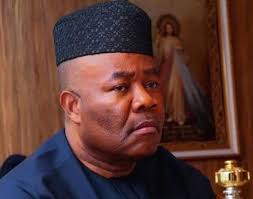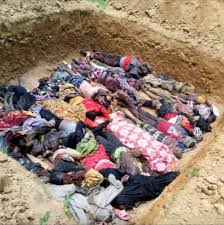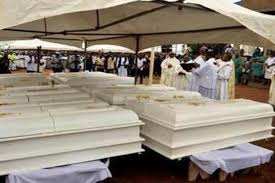
Senator Akpabio’s Deflection Highlights What Nigerians Already Knows: a State Enabling Christian Massacre
Enugu, Nigeria – October 10, 2025
Senator Godswill Akpabio recently sparked outrage across Nigeria when he dismissed U.S. senators’ calls to designate Nigeria as a Country of Particular Concern, labeling their advocacy as “ignorant.” His remarks, delivered from the Senate chamber, have been widely condemned as both insensitive and willfully uninformed.
U.S. Pressure and the Call for Accountability
The impetus behind the U.S. push is grave. Since 2009, Islamist and extremist violence in Nigeria has disproportionately targeted Christians, leaving tens of thousands dead and displacing millions. The International Society for Civil Liberties and the Rule of Law (Intersociety) reports that over 7,087 Christians were murdered in just the first 220 days of 2025 alone.
More broadly, Intersociety estimates that approximately 125,009 Christians have been killed since 2009. The report also records that at least 19,100 churches have been attacked, destroyed, or forcibly shut down over these years — an average of more than 100 per month, or three per day.
Given this staggering toll, the U.S. senators’ efforts are not hyperbole but a legitimate demand for accountability. Designating Nigeria as a Country of Particular Concern is not an affront, it is a recognition of a humanitarian and religious crisis that demands international attention.
Akpabio’s Faulty Rebuttal: Victim-Blaming by Design
Rather than grapple with escalating bloodshed, Akpabio chose diversion. He claimed that since the attacks target “Christian states,” Christians must by default be victims of religious massacre. This twisting of logic is deeply troubling: it conflates the identity of victims with justification for violence.
Critics argue that Akpabio’s logic dangerously mirrors that of the extremist groups themselves. These terrorist organizations, including Boko Haram and their allies, openly admit that their goal is to turn Nigeria into an Islamic state. Their attacks are not random or politically motivated, they are deliberately aimed at Christians because of their faith. Such an ideology leaves no room for religious diversity or peaceful coexistence.
By dismissing the U.S. senators’ concerns as ignorance, Akpabio not only insults the suffering of victims but absolves the state of any responsibility. He now stands accused of perpetuating a false equivalence between state and non-state violence designed to deflect scrutiny.
Divert, Deflect, Deny: His Tactics Unravel
Rather than confront the mass killing of Christians, particularly in Northern Nigeria, Akpabio shifted focus to the Southeast, accusing IPOB of criminal activities, allegations that numerous civil society groups have long dismissed as baseless and politically motivated. He then asked rhetorically, “If you look at what is happening in the South-East… will you ascribe that to religion?”
But this is a red herring. IPOB has explicitly stated its sole demand is a referendum, and have no room for violence. Why would a movement seeking to liberate a people kill them? IPOB has called for independent, international investigations into the criminalities in the region.
More to the point, Akpabio’s selective focus on the Southeast, while sidestepping the carnage in the North, betrays a deliberate political agenda. Rather than confront Islamist terror, he pivots to scapegoats of his choosing, a classic tactic of denial.
The State as Sponsor: From Negotiator to Collaborator
Anger at Akpabio’s remarks has been further inflamed by charges that the current government has been negotiating with terrorists, even recruiting them into security agencies. Critics say this blurs the lines between state and non-state violence, suggesting shared ideology and complicity.
In other words: how can one credibly argue that the state is failing to stop genocide, when by its own confession is arming and employing agents of that same genocide?
Threats, Bluster, and Economic Coercion
As the pressure mounts, Akpabio tried framing the U.S. concern as economic warfare. He accused the Trump-led (sic) U.S. administration of seeking to “strangle” Nigeria’s economy by adopting one-sided motions condemning its human rights record. He claimed their aim is to plunge the country into poverty.
Yet the lived reality of Nigerians today already mirrors that narrative. Nigeria has long been dubbed the “poverty capital” of the world, its citizens’ hardship is recognized as worse than that of countries ravaged by war. A shocking new UN report for 2025 has ranked Nigeria with the lowest life expectancy in the world. The national average is just 54.9 years, far below the global average of 73.7 years, and far below countries at war.
For a government claiming moral high ground to turn around and suggest that outside criticism is meant to impoverish its people is not just disingenuous, it is cynical.
What Akpabio should be asked, but likely won’t be, are questions that go to the heart of Nigeria’s crisis. Would he deny or admit that Christians are being systematically targeted because of their faith? How does he justify his silence on the massacres in the North while being quick to defend incidents in the Southeast? Does he reject or condone the alleged recruitment of former terrorists into Nigeria’s security agencies? And why does he continue to deflect rather than confront the damning data presented by Intersociety on Christian killings and the destruction of churches across the country?
These questions will not be answered by rhetorical flourishes, but by concrete actions: protecting vulnerable communities, severing ties with extremist networks, and submitting to independent investigations.
Conclusion: Words Will Not Cleanse the Blood
Akpabio’s speech was not just tone-deaf, it was emblematic of a deeper malaise: a state unwilling to confront its complicity in religious violence. When data from Intersociety and other credible monitors such as Amnesty International show that tens of thousands of Christians have been killed, churches destroyed, and entire communities displaced, what remains is not a choice between narrative and politics, but between murder and justice.
Nigeria’s dignity, its secularism, and salvation itself demand more than speeches. They demand accountability.

